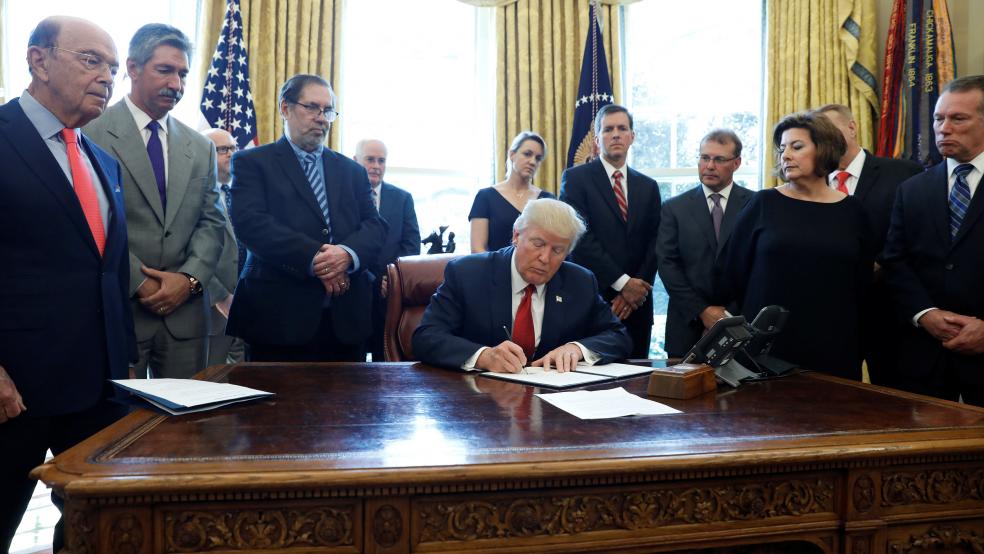WASHINGTON (Reuters) - President Donald Trump moved on Thursday against China and other exporters of cheap steel into the U.S. market, launching a federal investigation to determine whether foreign-made steel threatens U.S. steelmakers and national security.
Winning praise from U.S. companies that are constantly fighting with foreign competitors, Trump invoked a rarely-used trade law that raises the possibility of new tariffs. The action triggered a rally in U.S. steel stocks.
At a White House ceremony where he was surrounded by U.S. steel executives, Trump signed a memorandum ordering the U.S. Commerce Department to probe the impact of steel imports on the U.S. defense industrial base.
"Steel is critical to both our economy and our military. This is not an area where we can afford to become dependent on foreign countries," said Trump, a Republican.
The global steel market is in surplus. China is the largest national producer and makes far more steel than it consumes. To find buyers for its excess output, China sells steel cheap overseas, often undercutting domestic producers.
“Everything they export is dumping,” said Derek Scissors, Asia economist at the American Enterprise Institute, a Washington think tank.
U.S. Commerce Secretary Wilbur Ross cast the decision to initiate the probe as a response to Chinese exports of steel into the United States reaching the point where they now account for 26 percent of the U.S. market.
Chinese exports have risen "despite repeated Chinese claims that they were going to reduce their steel capacity," Ross said.
He said if the U.S. steel industry is deemed to be suffering from too much steel imports, he will recommend retaliatory steps that could include tariffs. Trump ordered a probe under Section 232 of the Trade Expansion Act of 1962, which lets the president impose restrictions on imports for reasons of national security.
News of the move triggered a rally for steel stocks, including Steel Dynamics Inc
, AK Steel , U.S. Steel , Nucor , Cliffs Natural Resources , and Allegheny Technologies .The United States has nearly 100 plants that make millions of tons of steel annually. The U.S. government attempts to shield them from cheap foreign steel chiefly by filing anti-dumping actions with the World Trade Organization, but the Trump administration said these have had little impact."The artificially low prices caused by excess capacity and unfairly traded imports suppress profits in the American steel industry," the administration said in a statement.The Defense Department's annual steel requirements comprise less than 0.3 percent of the industry’s output by weight.“There is no doubt that steel plays a role in our national security and the manufacturing of U.S. weapons systems,” said Jeff Bialos, a partner at law firm Eversheds Sutherland, who has worked on steel trade cases in the past."But the Department of Defense only consumes a small portion of domestic steel output, and this has decreased over the past decade as composites technology has advanced,” Bialos said.One of the military’s largest consumers of steel are U.S. Navy shipbuilders Huntington Ingalls Industries and Lockheed Martin Corp .Scissors questioned the administration's invoking of Section 232. He said the United States has other ways to take on China over steel trade issues, other than invoking national security.“Talking about it as a national security issue - I don’t think it’s necessary and I don’t think it’s justified,” he said.In October 2001, a Commerce Department investigation found "no probative evidence" that imports of iron ore and semi-finished steel threaten to impair U.S. national security.Use of Section 232 could send another political message. “It does say we are not the same kind of administration as previous administrations,” he added.The move is another step in Trump's "America First" policies in which he has tried to boost U.S. manufacturers and preserve American jobs. Trump won many votes in industrial Midwestern states like Michigan and Pennsylvania with a pledge to boost manufacturing and crack down on Chinese trade practices.Democrats were cautious about Trump's step.“While today’s executive order to investigate potential national security vulnerabilities due to steel imports is a step forward, I will hold the administration accountable on its promises to fight for working Americans," said Connecticut Representative Rosa DeLauro in a statement.U.S. Steel said China and other countries that have exported steel to the United States have cost U.S. manufacturing tens of thousands of jobs.“For too long, China and other nations have been conducting economic warfare against the American steel industry by subsidizing their steel industries, distorting global markets, and dumping excess steel into the United States. The effects have been staggering," a U.S. Steel statement said.The Commerce Department will have 270 days to complete the probe. Ross, a former steel executive, said he expected it to be done much sooner. (Additional reporting by Jeff Mason in Washington; and Luciana Lopez and Caroline Valetkevitch in New York; Editing by Kevin Drawbaugh and Nick Zieminski)



